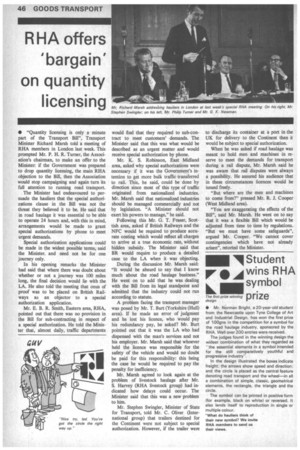RHA offers 'bargain' on quantity licensing
Page 48

If you've noticed an error in this article please click here to report it so we can fix it.
• "Quantity licensing is only a minute part of the Transport Bill", Transport Minister Richard Marsh told a meeting of RHA members in London last week. This prompted Mr. P. H. R. Turner, the Association's chairman, to make an offer to the Ministen if the Government was prepared to drop quantity licensing, the main RHA objection to the Bill, then the Association would stop campaigning and again turn its full attention to running road transport.
The Minister had endeavoured to persuade the hauliers that the special authorizations clause in the Bill was not the threat they believed it to be. He said that in road haulage it was essential to be able to operate 24 horns and, with this in mind, arrangements would be made to grant special authorizations by phone to meet urgent demands.
Special authorization applications could be made in the widest possible terms, said the Minister, and need not be for one journey only.
In his opening remarks the Minister had said that where there was doubt about whether or not a journey was 100 miles long, the final decision would lie with the LA. He also told the meeting that onus of proof was to be placed on British Railways as an objector to a special authorization application.
Mr. E. B. R. Smith, Eastern area, RHA, pointed out that there was no provision in the Bill for sub-contracting in respect of a special authorization. He told the Minister that, almost daily, traffic departments would find that they required to sub-contract to meet customers' demands. The Minister said that this was what would be described as an urgent matter and would receive special authorization by phone.
Mr. K. S. Robinson, East Midland area, asked why special authorizations were necessary if it was the Government's in tention to get more bulk traffic transferred to rail. This, he said, could be done by direction since most of this type of traffic originated from nationalized industries. Mr. Marsh said that nationalized industries should be managed commercially and not by legislation. "A Minister should not exert his powers to manage," he said.
Following this Mr. G. T. Fraser, Scottish area, asked if British Railways and the NFC would be required to produce accu rate costing which would reflect all charges to arrive at a true economic rate, without hidden subsidy. The Minister said that BR would require to produce a detailed case to the LA when it was objecting. During the discussion Mr. Marsh said: "It would be absurd to say that I know much about the road haulage business."
He went on to add that he was dealing with the Bill from its legal standpoint and admitted that the industry could not run according to statute.
A problem facing the transport manager was posed by Mr. T. Burt (Yorkshire (Hull)
area). If he made an error of judgment and he lost his licence, who would pay his redundancy pay, he asked? Mr. Burt pointed out that it was the LA who had dispensed with the man's services and not his employer. Mr. Marsh said that whoever held the licence was responsible for the safety of the vehicle and would no doubt be paid for this responsibility: this being the case he would be required to pay the penalty for inefficiency.
Mr. Marsh agreed to look again at the problem of livestock haulage after Mr.
S. Harvey (RHA livestock group) had indicated how delays could occur. The Minister said that this was a new problem to him.
Mr. Stephen Swingler, Minister of State for Transport, told Mr. C. Oliver (Inter national group) that trailers destined for the Continent were not subject to special authorization. However, if the trailer were to discharge its container at a port in the UK for delivery to the Continent then it would be subject to special authorization.
When he was asked if road haulage was meant to hold men and machines in reserve to meet the demands for transport during a rail dispute, Mr. Marsh said he was aware that rail disputes were always a possibility. He assured his audience that in these circumstances licences would be issued freely.
"But where are the men and machines to come from?" pressed Mr. R. J. Cooper (West Midland area).
"You are exaggerating the effects of the Bill", said Mr. Marsh. He went on to say that it was a flexible Bill which would be adjusted from time to time by regulations. "But we must have some safeguards", argued Mr. Cooper. "We cannot cover contingencies which have not already arisen", retorted the Minister.




































































































































































































































